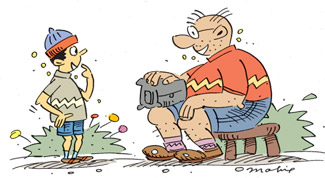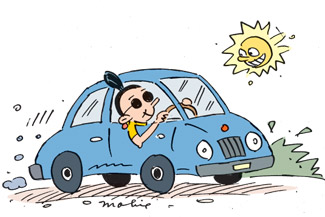|

by R. S. Karunaratne
Know when to use 'there'
As a pronoun 'there' introduces the fact that something or someone or
some event exists. It can also be used as an adverb.
1. 'There' is used to say that something exists or happens or that
something is in a particular place.
After the accident, there was blood all over the road.
|

There are lots of monkeys in
this forest.
|
Is there anything to eat?
How many girls are there in your class?
There was a landslide in Kandy.
There aren't any eggs left in the basket.
Was there a phone call for me?
2. 'There' is used to introduce new things or people into a
description, and say what they are doing.
There was a short fat man sitting in front of me.
After the tsunami warning there were people running away from the
sea.
There was a birthmark on her chin. It was a murder scene.
There was a detective right behind me!
3. 'There' is used for talking about the likelihood or desirability
of things existing.
There must be a mistake in your calculations.
Will there be another robbery in our neighbourhood?
There seems to be a leakage in the tank.
There used to be a kovil here, but the Portuguese had destroyed it.
4. 'There' is used to indicate people or things at some place away
from you.
A: Can you see Sri Pada from here?
B: Yes, there it is.
A: Where's the train that leaves for Maradana at 8.10 a.m.?
B: There it goes.
5. Collocations
'There are' is often followed by numbers, amounts and quantities.
There are lots of monkeys in this forest.
|

There was a short fat man sitting in front of me. |
There are a few mistakes in your essay.
There are hundreds of refugees in certain camps.
There are some people who never tell lies.
There are two sides to any dispute.
There are many tanks in Anuradhapura.
Are there stray dogs in Colombo?
6. 'There is/There are' is often followed by impersonal pronouns.
I knocked on the door but there was nobody in the house.
There is nothing I can do about it.
There is somebody at the door.
Is there anyone in the room?
Is there anything I can do now?
Certain prepositions often go before 'there' .
A: Where's my pen?
B: It's over there.
Put the bags up there on the rack.
8. Set phrases
Hi there , Maureen, how are you
Hello there, boys come for refreshments.
(These are informed greetings)
Is Dalrene there ?
(Used to ask for somebody)
I filled the form then and there and handed it over to the
receptionist. (immediately)
Fun with proverbs
By using proverbs you can put your thoughts across to the other
person in an effective manner. To possess this verbal tool is one of the
final touches you can add to your vocabulary and communication skills.
1. Dog eat dog
There is a competitive feeling that exists in each person to be ahead
of others. This is quite evident in work places.
2. Don't cry stinking fish
Nobody wants to buy rotten fish. Similarly nobody will associate with
you if you always expose your weaker points and negative side to others.
3. Don't kill the goose that lays the
golden egg.
Do not destroy something from which you derive some benefits.
4. Don't teach your grandmother to
suck eggs.
Do not try to instruct someone who is senior to you because he has
more experience than a raw recruit.
5. Draw the line
At times we have to define a limit or a point up to which we are
willing to go.
6. East or West, home is the best
You can visit many places or countries but you will never find the
happiness you enjoy at home. That's why you always want to return to it.
7. Easy come, easy go
When you earn money easily, you tend to waste it. On the contrary,
you will not waste hard-earned money.
8. An Englishman's home is his
castle.
You cannot enter a castle without permission from its owner,
similarly, you have a right to privacy in your own house.
9. Every cloud has a silver lining
We often go through difficult phases in life. However, at the end you
will find something that gives you happiness.
10. Every dog has his day
Everyone of us will get a chance to be happy in life. You are not
destined to lead a miserable life for ever.
11. Experience is the best teacher
You can teach someone how to do something. By doing that particular
task you gain experience which is more valuable than paper
qualifications.
12. Fall between two stools
Some people try to do certain tasks in a disorderly manner. They
always get unfavourable results in such situations.
Starters :
Adjectives of comparison
Comparative adjectives are used when two nouns are compared. When
more than two nouns are compared, use superlative adjectives.
Vijitha is smarter than Gamini. (comparative adjective)
|

This is the most expensive car
in our country.
|
Abeysekara is the shortest among the staff members. (superlative
adjective)
'More' is used with some two-syllable, three syllable or more
syllable adjectives to form the comparative.
Ash is more beautiful than Kalpana.
For some students mathematics is more difficult than history.
A good fountain pen is more expensive than a ballpoint pen.
Shyama is more careful than Padma.
Mother is more patient than father.
'Most' is used with some two-syllable, three syllable or poly
syllable adjectives to make the superlative form.
Shehana is the most attractive girl in the class.
This is the most expensive car in our country.
Aruni is the most enthusiastic member of the debating team.
Riza is the most practical among his brothers.
This cake is the most delicious one I have ever eaten.
Do not use 'er' ending and 'more' together. Similarly, do not use 'est'
ending and 'most' together.
Activity
Underline the correct form.
1. Apartment A is more attrative / most attractive than apartment B.
2. Gnanam is most patient / more patient than me.
3. Selva is the most creative / more creative artist in our school.
4. Sanka is more taller than / taller than Vivek.
5. Evelyn is thinner / more thinner than Luxmie.
**********
[Key]
1. more attractive
2. more patient
3. the most creative
4. taller than
5. thinner
********** |

